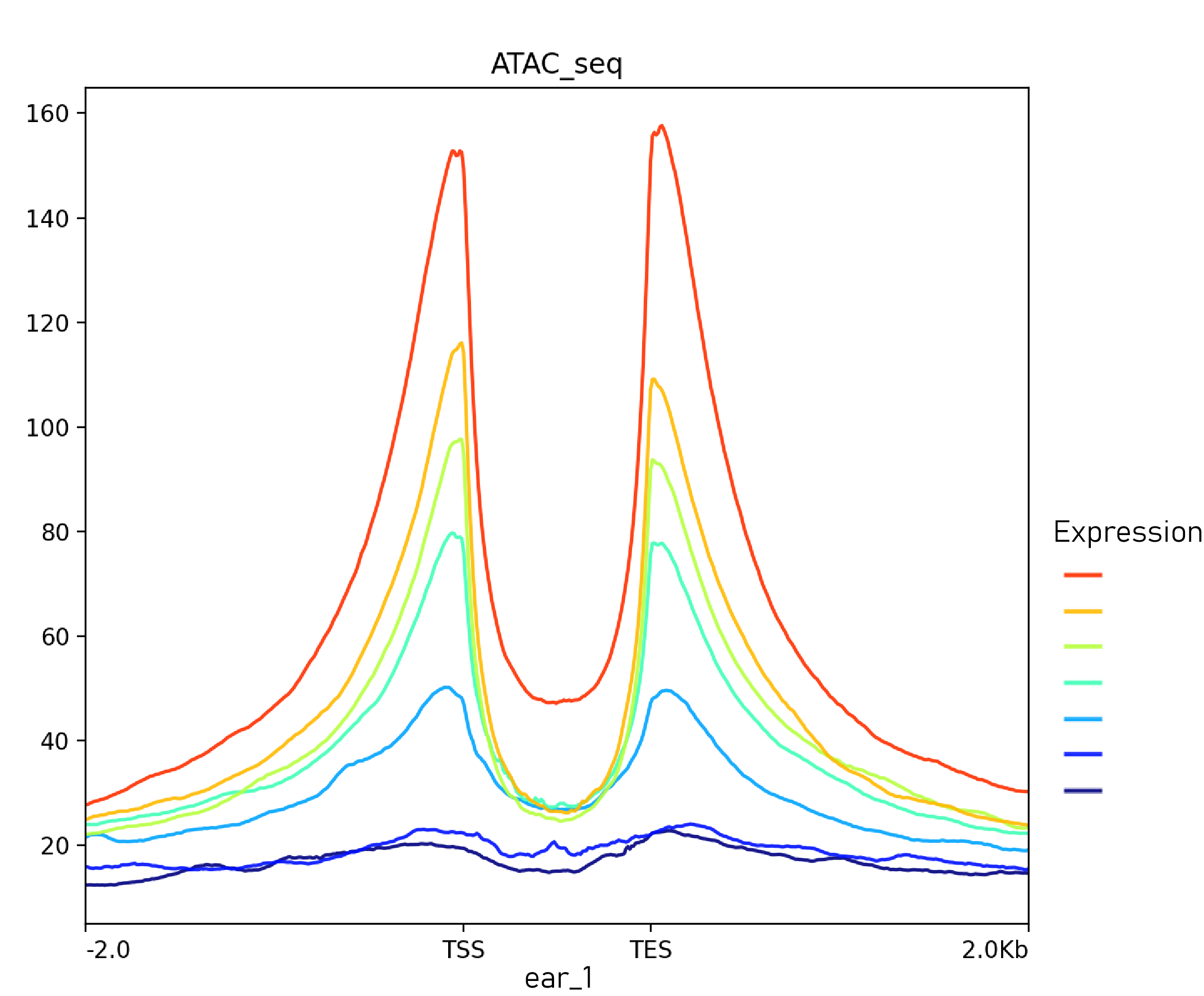使用deeptools的 computeMatrix + (plotHeatmap or plotProfile)可以针对某些特定类型的区域如TTS、TES的指定区域范围进行信号富集程度的可视化
computeMatrix’s parameters
computeMatrix提供两个不同参数(parameters)以指定不同的参考系
1
2
3
4
5
6
7
8
9
10
|
Commands:
scale-regions In the scale-regions mode, all regions in the BED file are
stretched or shrunken to the length (in bases) indicated by
the user.
reference-point
Reference-point refers to a position within a BED region
(e.g., the starting point). In this mode, only those
genomicpositions before (upstream) and/or after (downstream)
of the reference point will be plotted.
|
对于reference-point,只指定一个参考点(TTS,TES,center),因此对于基因组区域文件 <bed file(s)>,不会对不同基因均一化,直接使用指定上游或者下游一段距离
对应scale-region,会均一化基因长度,使得不同基因TSS至TES之间区域长度一致。
1
2
3
4
5
6
|
--regionBodyLength REGIONBODYLENGTH, -m REGIONBODYLENGTH
Distance in bases to which all regions will be fit. (Default:
1000)
--binSize BINSIZE, -bs BINSIZE
Length, in bases, of the non-overlapping bins for averaging the
score over the regions length. (Default: 10)
|
在众多参数中,computeMatrix通过 regionBodyLength和 binSize来确定将不同基因分成相同分数的bin长度,使得基因长度均一化。
默认参数中 regionBodyLength=1000 binSize=10,因此份数为1000/10=100,也就是将不同的基因统一切成100块,每一块参数对应一段bin内所有信号加和除以bin长度的平均值。
对不同组蛋白_ChIP-seq测序数据画图
针对与不同的目的蛋白结合的 DNA 片段进行测序数据,我们可以一次性输入多个对应的bigwig文件画成一张图。
具体代码:
1
2
3
4
5
6
7
8
9
10
11
12
13
14
15
16
17
18
|
bed=/home/ljx/yuanh/work_data/Ref_genome/220721_Maize_B73_V4/Maize_gene_1-10_chr.bed
for org_path in /home/yuanhx/dzx/230612_encher_data/0*; do
org=$(basename $org_path | sed 's/^...//')
bw_files=""
for bw_id in $org_path/result/0*/bam/*bigwig; do
bw_files="$bw_files $bw_id"
done
computeMatrix scale-regions -p 10 \
-b 2000 -a 2000 \
-R $bed \
-S $bw_files \
--missingDataAsZero \
--skipZeros -o $org_path/result/matrix_${org}_2K.gz
plotHeatmap -m $org_path/result/matrix_${org}_2K.gz \
-out /home/yuanhx/dzx/230612_encher_data/${org}_Heatmap_2K.png
done
|

对甲基化测序数据画图
初始数据处理
1
2
3
4
5
6
7
8
9
10
11
|
$ head -100 output-prefix.bsmap.mkdup_CHG.bedGraph
track type="bedGraph" description="output-prefix.bsmap.mkdup CHG methylation levels"
1 1472 1473 100 9 0
1 1474 1475 90 311 34
1 1533 1534 75 6 2
1 1535 1536 69 99 43
1 1562 1563 33 3 6
1 1581 1582 37 3 5
1 1654 1655 50 2 2
1 1712 1713 75 9 3
1 1714 1715 100 3 0
|
直接使用原始bedGraph数据通过 bedGraphToBigwig 转换成bigwig文件画图,missingdata过多,热图黑色部分贼多
人工分bin,将1号染色体的最开始片段位置初始化0,按照100bp分段,对应的四列数据百分比处理
最后处理后的格式如下:
画图代码:
1
2
3
4
5
6
7
8
9
10
11
12
13
14
15
16
17
18
19
|
bed="/home/ljx/yuanh/work_data/Ref_genome/220721_Maize_B73_V4/Maize_gene_1-10_chr.bed"
for id in /home/yh/dzx/work/231017_methylation/methylation_bigwig_data/*;do
org=`echo $id | cut -d '/' -f 8`
echo "org:$org"
bigwig_files=`ls $id/*.bigwig`
echo -e "bigwig_files:\n$bigwig_files"
computeMatrix scale-regions -p 10 \
-b 2000 -a 2000 \
-R $bed \
-S $bigwig_files \
--missingDataAsZero \
--skipZeros -o /home/yh/dzx/work/231017_methylation/matrix/$org/matrix.gz
echo "$org matrix.gz done"
plotHeatmap -m /home/yh/dzx/work/231017_methylation/matrix/$org/matrix.gz \
-out /home/yh/dzx/work/231017_methylation/plotHeatmap/$org/${org}_Heatmap_2K.pdf
echo "$org heatmap done"
done
|

分表达水平高低绘制信号富集谱图
给基因区域bed文件赋值基因表达数据,将表达数据赋值至最后一列
1
2
3
4
5
6
7
8
9
10
11
12
13
14
15
16
17
18
19
20
21
22
23
24
25
26
27
28
29
30
31
32
33
34
|
gene_bed <- read.table("gene_length.bed", header = F, sep = "\t", stringsAsFactors = F)
exp_data_1 <- read.csv("/home/yuanhx/dzx/work_data/exp_data/lai_py_expressed.csv", header = T)
exp_data_2 <- read.csv("/home/yuanhx/dzx/work_data/exp_data/yang_ear_tassel.csv", header = T)
gene_bed$V6 <- sub("ID=gene:", "", gene_bed$V6)
exp_data_1$tracking_id <- as.character(exp_data_1$tracking_id)
exp_data_2$tracking_id <- as.character(exp_data_2$tracking_id)
orgs <- c("ear_1", "ear_2", "shoot_1", "shoot_2", "tassel")
for (org in orgs){
for (i in 1:nrow(gene_bed)){
if(org %in% c("ear_1", "shoot_1","shoot_2")){
if(gene_bed$V6[i] %in% exp_data_1$tracking_id == F){
gene_bed$V8[i] <- "not_found"
next
}
if(org %in% c("ear_1", "shoot_1")){
gene_bed$V8[i] <- exp_data_1[which(exp_data_1$tracking_id == gene_bed$V6[i]), paste0("average.",sub("..$","",org))]
}
else if(org == "shoot_2"){
gene_bed$V8[i] <- exp_data_1[which(exp_data_1$tracking_id == gene_bed$V6[i]), paste0(sub("..$","",org),".average")]
}
}
else{
if(gene_bed$V6[i] %in% exp_data_2$tracking_id == F){
gene_bed$V8[i] <- "not_found"
next
}
if(org == "ear_2") org = "ear"
gene_bed$V8[i] <- exp_data_2[which(exp_data_2$tracking_id == gene_bed$V6[i]), paste0("average.",org)]
org = "ear_2"
}
}
write.table(gene_bed, file.path(org, paste0(org, "_gene_exp",".bed")), row.names = F, col.names = F, sep = "\t")
}
|
做实验的提供的表达量数据格式真的是个无敌复杂,而且总是多次用到,应该找个时间优化一下格式
根据表达量切分bed文件
1
2
3
4
5
6
7
8
9
10
11
12
13
14
15
16
|
#!/bin/bash
data_dir="/home/yuanhx/dzx/org_gene_bed/"
for subdir in ear_1 ear_2 shoot_1 shoot_2 tassel; do
echo "处理子目录: $subdir"
cd "$data_dir$subdir"
gene_exp_file=*gene_exp.bed
# 对文件按照表达量排序
sort -k 8,8n $gene_exp_file > sorted_gene_exp.bed
split -d -n l/7 sorted_gene_exp.bed split_
for ((i=0; i<7; i++)); do
mv "split_0$i" "part$i.bed"
done
echo "处理完成: $gene_exp_file"
cd "$data_dir"
done
|
处理后文件存放格式如此

画图
1
2
3
4
5
6
7
8
9
10
11
12
13
14
15
16
17
|
for id in /home/yuanhx/dzx/230612_encher_data/0*/result/0*/bam/*bigwig; do
org=$(echo $id | awk -F'/' '{print $6}' | cut -c4-)
bed_files=""
for bed_id in /home/yuanhx/dzx/org_gene_bed/$org/part*.bed; do
bed_files="$bed_files $bed_id"
done
out_path=$(echo $id | cut -d'/' -f1-8)
seq_name=$(basename $id | cut -d'.' -f1)
computeMatrix scale-regions -p 11 \
-b 2000 -a 2000 \
-R $bed_files \
-S $id \
--missingDataAsZero \
--skipZeros -o $out_path/matrix/${seq_name}_2k.gz
plotProfile -m $out_path/matrix/${seq_name}_2k.gz -out $out_path/matrix/${seq_name}_Profile_2K.png
done
|

-S bigwig文件 -R bed文件可以分别传入多个



